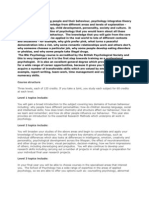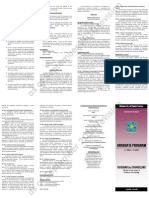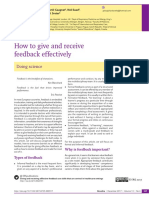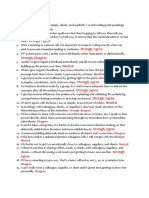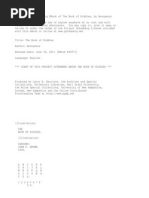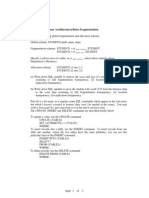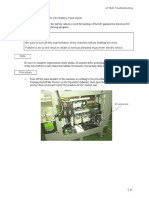Beautiful Girls Inside
Beautiful Girls Inside
Uploaded by
EnglishUrduDiaryCopyright:
Available Formats
Beautiful Girls Inside
Beautiful Girls Inside
Uploaded by
EnglishUrduDiaryOriginal Description:
Copyright
Available Formats
Share this document
Did you find this document useful?
Is this content inappropriate?
Copyright:
Available Formats
Beautiful Girls Inside
Beautiful Girls Inside
Uploaded by
EnglishUrduDiaryCopyright:
Available Formats
162
Institute of Psychology
The Institute of Psychology at the Beaconhouse National University was established in
2004, to provide opportunities in the private
sector for higher studies in Psychology. The
Institute oers a broad range of programs in
Psychology that not only communicate
contemporary knowledge but also train
students in general skills of research, critical
thinking, statistical analysis, as well as written
and oral communication. Our approach is
evolutionary; we constantly update our
courses to ensure that they remain challenging
and relevant. The programs are conducted
with the collaboration of psychiatric units at
teaching hospitals and other educational and
business organizations in the private and public
sector. It is to date the only institute in Pakistan
that oers specialized masters programs in
diverse elds of Psychology such as Clinical,
Counseling, Organizational and School Psychology. Our emphasis on professional training
facilitates students in the applied areas of the
discipline.
What makes our programs distinctive is the
academically rigorous but supportive culture
that prevails on campus. It oers an environment that is genuinely warm and friendly, and
places a very high value on services provided to
students. With the sta student ratio of 1:10,
we can ensure quality. Small seminar groups
and tutorials give students the opportunity to
interact with teachers and fellow students.
This sort of tuition is the hallmark of BNU
higher education and has proven value. The
Institute follows the best of traditional
methods of teaching and the best of what is
new. It strives to ensure that students receive a
well-rounded and informed perspective in the
discipline of Psychology. Its emphasis on
communication skills and research encourages
the development of critical thinking that is
essential for the applied elds of the discipline.
The Institute has a fully equipped Experimental, Social and Psychological Testing laboratory
and the courses are designed to meet the
following targets:
To provide rst-rate instruction and practical
training in various areas of Psychology such as:
Child and Developmental Psychology,
Abnormal and Clinical Psychology, Health
Psychology, Guidance and Counseling,
Business and Organizational Psychology, Social
Psychology, Cognitive Psychology, Experimental Psychology, Psychological Testing and
Assessment, Advertising and Consumer
Psychology, Educational and School Psychology, and Cognitive and Behavioral Neuroscience.
To conduct basic and applied research on
topics relevant to our society with a view to
study the existing psychological problems in
the community. The Institute plans to promote
interdisciplinary research for the solution of
social, educational, industrial and clinical
problems.
To develop data-base and indigenous
psychological assessment tools for research
and assessment purposes.
To gain indigenous knowledge about the
prevalence and treatment of various psychological problems in Pakistan.
To equip students with problem solving skills
that would not only help them in personal
adjustment but will also help them to facilitate
others to adjust to the demands of everyday
life.
To help students to maximize their potential
as individuals, as Pakistanis, and as good
human beings.
1. B.Sc. (Hons.) in Applied
Psychology
Program Overview
The program includes in-depth supervised
training in Applied Psychology, Research and
Practice. Students can specialize in the areas of
Clinical, Organizational, Counseling, Develop-
mental and School Psychology. The collaboration of psychiatric units at teaching hospitals
and other educational and business organizations in the private and public sectors is utilized
to achieve this goal.
The eight-semester (four-year) B.Sc. (Hons.) in
Applied Psychology is a large and popular
program within the Institute of Psychology. It is
designed to be equated with the curriculum
being taught at leading international universities. The degree aims to provide a thorough
grounding in the theories, methods and
debates in Psychology. It further aims to
develop the ability to analyze and evaluate
psychological concepts and theories using both
quantitative and qualitative data.
Course Outline
B.Sc. (Hons.) in Applied Psychology
A four-year program divided into eight semesters as given below:
Year 1 \ Semester I
Course Code
PSY 101
PSY 110
PSY 115
PSY 135-A
PSYM 100
Se 101-S
Course Title
Introduction to Perspectives in Psychology
Psychosocial Influences on Behavior
Cognition: Sensation, Perception and Emotion
Exercises in Psychological Investigation
Introduction to Computers Mandatory
Foundation English
*One Elective Course
Credits
2
3
3
2
2
3
Total
Year 1 \ Semester Il
Course Code
PSY 105
PSY 120
PSY 125
Se 101-A
SLA 102
Course Title
Biological Basis of Behavior
Statistics in Psychology
Cognition: Learning, Memory and Intelligence
Communication Skills I
Pakistan Studies Mandatory
*One Elective Course
15
Credits
3
4
3
3
3
Total
16
163
IP
IP
Introduction
Beaconhouse National University
B.Sc. (Hons.) in Applied Psychology
Year 2 \ Semester llI
Course Code
PSY 201
PSY 205
PSY 210-A
PSY 310
Se 101-B
Beaconhouse National University
Course Title
Research Methodologies and Application
Child Psychopathology
Developmental Psychology
School Psychology
Communication Skills II
*One Elective Course
Credits
3
3
3
3
3
Total
Year 2 \ Semester IV
Course Code
PSY 220
PSY 225
PSY 230
PSY 235
Course Title
Psychometrics
Adult Psychopathology
Applied Statistics
Social Cognition
*One Elective Course
Year 3 \ Semester V
Course Code
PSY 305
PSY 315
PSY 405
PSY 410-A
PSYM 102
Course Title
Counseling Psychology
Behavioral and Cognitive Neuroscience
Personality
Environmental Psychology
*One Elective Course
Credits
3
3
3
3
Total
14
Year 4 \ Semester Vll
Course Code
PSY 340
PSY 325-A
PSY 330
PSY 401
PSY 470-A
PSY 415
Course Title
Summer Project Internship and Case Reports
Current Issues in Psychology
Career Counseling
Thesis I
Or
Research Project I
Psychological Report Writing/Case Studies
Credits
4
4
3
4
Total
Course Title
Stress and Well-Being
Therapeutic Interventions in Clinical Psychology
Human Resource Management
Gender Studies
Islamic Studies Mandatory
*One Elective Course
Credits
3
4
3
3
3
Total
12
15
Credits
4
3
4
3
Total
Year 3 \ Semester VI
Course Code
PSY 320
PSY 335
PSY 345
PSY 460
16
Year 4 \ Semester VIII
Course Code
PSY 215
PSY 420
PSY 470-B
PSY 455
PSY 465
Course Title
Seminar Presentation
Thesis II
Or
Research Project II
Ethics and Professional Issues
Organizational Behavior
3
4
19/18
Credits
3
4
Total
3
3
3
13/12
165
IP
IP
164
166
B.Sc. (Hons.) in Applied Psychology
163
*Students are required to take the above mentioned courses plus 18 credit hours in elective subjects of their choice.
List of Electives
IP
Subjects offered as electives to students by the Institute of Psychology are the following.
Course Code
PSY 2PSY 101
PSY 105
PSY 110
PSY 115
PSY 125
PSY 130
PSY 210
PSY 235
PSY 240
PSY 305
PSY 330
PSY 345
PSY 350
PSY 355
PSY 405
PSY 460
PSY 465
Course Title
Introduction to Perspectives in Psychology
Biological Basis of Behavior
Psychosocial Influences on Behavior
Cognition: Sensation, Perception and Emotion
Cognition: Learning, Memory and Intelligence
Introduction to Cultural Studies
Child Development
Social Cognition
Pakistan Literature
Stress and Well-Being
Career Counseling
Personality
Gender and Media
Peace Psychology
Human Resource Management
Environmental Psychology
Organizational Behavior
* Optional courses will be offered according to the availability of the teacher.
** 1 credit for attendance in academic activities and academic excursions as given below:
Attendance in seminars, educational trips, volunteer work with the disabled, and other academic activities.
Credits
2
3
3
3
3
3
3
3
3
3
3
3
3
3
3
3
3
M.Sc. in Counseling Psychology
Counseling is a distinct profession that has
developed in a variety of ways in the 20th
century. The Institute of Psychology oers the
Master of Science Program in Counseling
Psychology. This program teaches students to
develop essential diagnostic, therapeutic, and
consultative skills necessary to treat a variety of
emotional, intellectual, and psychological
conditions in general population ranging from
children to the elderly. The program does not
advocate any single theoretical orientation.
Rather, it provides students with a generalist
foundation in a number of diagnostic methods
and therapeutic techniques. After doing M.Sc.
in Counseling Psychology students can work in
clinics and hospitals, family counseling centers,
substance abuse programs, community mental
health centers, public and private schools,
institutional
and
residential
facilities,
correctional facilities, public agencies, and
private practice.
Program Highlights
All faculty members are practitioners in the
eld.
Program bridges the eld of Clinical Psychology with the Counseling profession.
Emphasis on practitioner-focused learning in
real-world settings.
Excellent theoretical classroom training
coupled with unrivaled out-of-classroom
learning opportunities in a dynamic environment.
Program prepares students to take eective
roles in the community as mental health
professionals.
Program Objectives
Students will learn the theoretical
frameworks and scientic bases of Counseling
Psychology at the masters level.
Students will develop the essential diagnostic, therapeutic, and consultative skills
Beaconhouse National University
necessary to work with dierent clinical and
general populations and a variety of emotional
and psychological conditions.
Students will learn research methodology
and will be able to critically evaluate research
as it relates to Counseling Psychology.
Students will learn the ethical and
professional guidelines of the Counseling
profession.
Students will understand and appreciate the
impact of diversity and cultural issues in the
eld of Counseling Psychology.
Students will learn how to apply the
knowledge of human behavior to improve their
own lives.
169
Course Outline
M.Sc. in Counseling Psychology
A two-year program divided into four semesters as given below:
Year 1 \ Semester I
Course Code
PSY 501
PSY 505
PSY 510
PSY 520
PSY 555
PSY 575
Year 1 \ Semester Il
Course Code
PSY 515
PSY 525
PSY 530
PSY 535
PSY 540
PSY 550
Year 2 \ Semester Ill
Course Code
PSY-Co 605
PSY-Co 620
PSY-Co 625
PSY-Co 610-A
PSY-Co 635
PSY-Co 640
PSY-Co 660-695
Course Title
Perspectives in Psychology
Research Methods
Statistics in Psychology
Child Psychopathology
Experiments / Practical Work
Psychosocial Influences on Behavior
Total
Credits
2
3
4
3
2
3
17
Total
Credits
3
3
3
3
4
4
20
Course Title
Perception, Cognition, Learning and Memory
Personal and Interpersonal Perspectives
Biological Basis of Behavior
Adult Psychopathology
Psychological Testing and Assessment
Applied Statistics in Psychology
Course Title
Counseling for Children & Adults
Developmental Psychology
Thesis I
or
Group Research I
Current Issues in Counseling Psychology
Counseling Reports
One Optional Course
Credits
4
3
4
Total
3
4
4
3
22/21
IP
IP
168
IP
170
M.Sc. in Counseling Psychology
Year 2 \ Semester IV
Course Code
PSY-Co 545
PSY-Co 615
PSY-Co 630
PSY-Co 650
PSY-Co 645-B
PSY-Co 660-695
Course Title
Behavioral and Cognitive Neuroscience
Trauma and Crisis Intervention
Ethics in Counseling Psychology
Thesis II
or
Group Research II
One Optional Course
Credits
4
2
3
4
Total
Total Credit Hours
3
3
16/15
75/73
* Admission subject to number of students.
Optional Courses
Course Code
PSY-Co 570
PSY-Co 580
PSY-Co 660
PSY-Co 665
PSY-Co 670
PSY-Co 675
PSY-Co 680
PSY-Co 685
PSY-Co 690
PSY-Co 695
Course Title
Counseling Psychology
Peace Psychology
Stress and Well-Being
Emotional Intelligence
Health Counseling
Conflict Resolution
Counseling in Multicultural Contexts
Career Development and Counseling
Environmental Psychology
Counseling in Organizations
*Optional Courses will be offered according to the availability of the teacher.
Credits
3
3
3
3
3
3
3
3
3
3
Beaconhouse National University
M.Sc. in School and Educational Psychology
The role of educational system in our society is
becoming increasingly important and complex,
so is the need for professionally trained School
Psychologists at the primary and secondary
schools, colleges and institutions of higher
education has become more essential than
ever. School psychologist helps students as well
as teachers, administrators and parents to
overcome obstacles of learning and personal
development. These obstacles include learning
disabilities, academic diculties, family
disruptions, emotional and mental health
problem. The Master of Science program in
School Psychology is a clinical specialty which
prepares students to enter the profession of
School Psychology.
The program is designed to address the
academic, research and professional practice
requirements for certication as a psychologist
where masters level preparation is permitted.
The two year program balances research,
theory and practice. It follows a holistic
approach and addresses students trends and
needs within the context of home, school and
community. In Pakistan there is a great need of
qualied School Psychologists who can
facilitate the students to overcome their
problems so that they can realize their full
potential.
Program Highlights
Emphasis on practitioner-focused learning in
real-world settings.
Excellent theoretical classroom training
coupled with unrivaled out-of-classroom
learning opportunities in a dynamic environment.
Program prepares students to take eective
roles in the community as mental health
professionals.
Program Objectives
Students will learn the theoretical
frameworks and scientic bases of School and
Educational Psychology at masters level.
Students will develop the essential diagnostic, therapeutic, and consultative skills
necessary to work with a variety of emotional
and psychological conditions.
Students will learn research methodologies
and be able to critically evaluate research as it
relates to School and Educational Psychology.
Students will learn the ethical and
professional guidelines of the profession.
Students will understand and appreciate the
impact of diversity and cultural issues in the
eld of School and Educational Psychology.
Admission Requirements
To be eligible for admission to the M.Sc. in
School Psychology, a candidate must have good
academic record with B.A / B.Sc. in Psychology
or Applied Psychology from a well established
and respectable university. A written English
test followed by an interview will be taken in
case of short listed candidates.
173
Course Outline
A two-year program divided into four semesters as given below:
Year 1 \ Semester I
Course Code
PSY 501
PSY 505
PSY 510
PSY 520
PSY 555
PSY 575
Year 1 \ Semester Il
Course Code
PSY 515
PSY 525
PSY 530
PSY 535
PSY 540
PSY 550
Year 2 \ Semester Ill
Course Code
PSY-Sc 605
PSY Sc 620
PSY-Sc 625
PSY-Sc 610-A
PSY-Sc 635
PSY-Sc 640
PSY-Sc 560,
565, 660-695
Course Title
Perspectives in Psychology
Research Methods
Statistics in Psychology
Child Psychopathology
Experiments / Practical Work
Psychosocial Influences on Behavior
Total
Credits
2
3
4
3
2
3
17
Total
Credits
3
3
3
3
4
4
20
Course Title
Perception, Cognition, Learning and Memory
Personal and Interpersonal Perspective
Biological Basis of Behavior
Adult Psychopathology
Psychological Testing and Assessment
Applied Statistics in Psychology
Course Title
Psychology of the Child and Adolescent
Developmental Psychology
Thesis I
or
Group Research I
Current Debates in School Psychology
Reports
One Optional Course
Credits
4
3
4
3
4
4
3
Total
22/21
IP
IP
172
IP
174
M.Sc. in School and Educational Psychology
Year 2 \ Semester IV
Course Code
PSY-Sc 545
PSY-Sc 615
PSY-Sc 630
PSY-Sc 650
PSY-Sc 645-B
PSY-Sc 560,
565, 660-695
Course Title
Behavioral & Cognitive Neuroscience
Prevention and Crisis intervention in Schools
Ethics in School Psychology
Thesis II
or
Group Research II
One Optional Course
Credits
4
3
3
4
3
3
Total
Total Credit Hours
17/16
76/74
* Admission subject to number of students.
Optional Courses
Course Code
PSY-Sc 560
PSY-Sc 565
PSY-Sc 580
PSY-Sc 655
PSY-Sc 660
PSY-Sc 665
PSY-Sc 670
PSY-Sc 675
PSY-Sc 680
PSY-Sc 685
PSY-Sc 690
PSY-Sc 695
Course Title
Environmental Psychology
Organizational Behavior
Peace Psychology
Career Development & Counseling
Stress and Well-Being
Emotional Intelligence
Speech Pathology
Conflict Resolution
Good Parenting
Health Psychology
Counseling Psychology
Altruism
*Optional courses will be offered according to the availability of the teacher.
Credits
3
3
3
3
3
3
3
3
3
3
3
3
M.Sc. in Clinical Psychology
The M.Sc. in Clinical Psychology is an intensive
two-year full time course that concentrates on
understanding individual dierences and
psychological disorders experienced by
children, youth, and families. This includes a
focus on social, emotional, cognitive, and
neurobiological features of normal and atypical
development; approaches to assessment,
diagnosis and intervention; and risk and protective factors that inuence the nature and
progression of atypical development and
response to treatment. Students receive
training that allows them to enter careers
involving clinical and/or research positions in a
variety of settings as well as careers in
university teaching and research.
Program Highlights
All faculty members are practitioners in the
eld.
Emphasis on practitioner-focused learning in
real-world settings.
Excellent theoretical classroom training
coupled with unrivaled out-of-classroom
learning opportunities in a dynamic environment.
Program prepares students to take eective
roles in the community as mental health
professionals.
Program Objectives
Students will learn the theoretical
frameworks and scientic basis of Clinical
Programs and Degrees Offered
Psychology.
Students will develop the clinical skills that
are required when working with the individuals
suering from emotional and psychological
problems.
Students will learn research methodologies
and be able to critically evaluate research as it
relates to Clinical Psychology.
Students will learn the ethical and
professional guidelines of the profession.
Students will be enabled to understand and
appreciate the impact of diversity and cultural
issues in the eld of Clinical Psychology.
177
Course Outline
A two-year program divided into four semesters as given below:
Year 1 \ Semester I
Course Code
PSY 501
PSY 505
PSY 510
PSY 520
PSY 555
PSY 575
Year 1 \ Semester Il
Course Code
PSY 515
PSY 525
PSY 530
PSY 535
PSY 540
PSY 550
Year 2 \ Semester Ill
Course Code
PSY-Co 605
PSY-Co 620
PSY-Co 625
PSY-Co 610-A
PSY-CL 635
PSY-CL 640
PSY-CL 560, 565,
570, 690-695
Course Title
Perspectives in Psychology
Research Methods
Statistics in Psychology
Child Psychopathology
Experiments / Practical Work
Psychosocial Influences on Behavior
Total
Credits
2
3
4
3
2
3
17
Total
Credits
3
3
3
3
4
4
20
Course Title
Perception, Cognition, Learning and Memory
Personal and Interpersonal Perspective
Biological Basis of Behavior
Adult Psychopathology
Psychological Testing and Assessment
Applied Statistics in Psychology
Course Title
Counseling for Children & Adults
Developmental Psychology
Thesis I
or
Group Research I
Current Debates in Clinical Psychology
Clinical Reports
One Optional Course
Credits
4
3
4
3
4
4
3
Total
22/21
IP
IP
176
IP
178
M.Sc. in Clinical Psychology
Year 2 \ Semester IV
Course Code
PSY-CL 545
PSY-CL 615
PSY-CL 630
PSY-CL 650
PSY-CL 645-B
PSY-CL 560, 565,
570, 660-695
Course Title
Behavioral and Cognitive Neuroscience
Trauma and Crisis Intervention
Ethics in Clinical Psychology
Thesis II
or
Group Research II
One Optional Course
* Admission subject to number of students.
Optional Courses
Course Code
PSY-CL 560
PSY-CL 565
PSY-CL 570
PSY-CL 580
PSY-CL 655
PSY-CL 660
PSY-CL 665
PSY-CL 670
PSY-CL 675
PSY-CL 680
PSY-CL 685
PSY-CL 695
Course Title
Environmental Psychology
Organizational Behavior
Counseling Psychology
Peace Psychology
Career Development & Counseling
Stress and Well-Being
Emotional Intelligence
Forensic Psychology
Conflict Resolution
Parapsychology
Health Psychology
Psychology of Gender
*Optional courses will be oered according to the availability of the teacher.
Credits
4
2
3
4
3
3
Total
Total Credit Hours
16/15
75/73
Credits
3
3
3
3
3
3
3
3
3
3
3
3
M. Sc. in Organizational and Business Psychology
Business and Organizational Psychology studies
the application of behavior principles and
research in business and organizational
settings. Students learn about leadership
theories, group development, conict management, business marketing, consumer psychology, organizational culture and organizational
change strategies. The program enables
students to conduct workplace testing and
assessment, teach, pursue consulting,
professional coaching, and work as human
resource managers.
Program Highlights
Emphasis on practitioner-focused learning in
real-world settings.
Excellent theoretical classroom training
coupled with unrivaled out-of-classroom
learning opportunities in a dynamic environment.
Program prepares students to take eective
roles in the community.
Program Objectives
Students will develop the essential consultative skills necessary to work with a variety of
emotional and psychological conditions in
organizational settings.
Students will learn research methodologies
and be able to critically evaluate research as it
relates to issues in the business world.
Students will learn the ethical and
professional guidelines of the profession.
Students will understand and appreciate the
impact of diversity and cultural issues in work
environment.
Students will learn how to apply the
knowledge of human behavior to improve their
own lives.
Beaconhouse National University
181
Course Outline
A two-year program divided into four semesters as given below:
Year 1 \ Semester I
Course Code
PSY 501
PSY 505
PSY 510
PSY 520
PSY 555
PSY 575
Year 1 \ Semester Il
Course Code
PSY 515
PSY 525
PSY 530
PSY 535
PSY 540
PSY 550
Year 2 \ Semester Ill
Course Code
PSY- O 615
PSY- O 625
PSY- O 610-A
PSY- O 630
PSY- O 635
PSY- O 640
PSY- O 660-690
Course Title
Perspectives in Psychology
Research Methods
Statistics in Psychology
Child Psychopathology
Experiments / Practical Work
Psychosocial Influences on Behavior
Total
Credits
2
3
4
3
2
3
17
Total
Credits
3
3
3
3
4
4
20
Course Title
Perception, Cognition, Learning and Memory
Personal/ Interpersonal Perspective
Biological Basis of Behavior
Adult Psychopathology
Psychological Testing and Assessment
Applied Statistics in Psychology
Course Title
Workplace Interventions
Thesis I
or
Group Research I
Human Resource Management
Current Issues in Organizational and Business Psychology
Business and Organizational Reports
One Optional Course
Total
Credits
4
4
3
3
4
4
3
22/21
IP
IP
180
IP
182
M. Sc. in Organizational and Business Psychology
Year 2 \ Semester IV
Course Code
PSY- O 545
PSY- O 605
PSY- O 620
PSY- O 650
PSY- O 645-B
PSY- O 660-690
Course Title
Behavioral and Cognitive Neuroscience
Organizational Behavior
Occupational Stress
Thesis II
or
Group Research II
One Optional Course
* Admission subject to number of students.
Optional Courses
Course Code
PSY-O 580
PSY-O 655
PSY- O 660
PSY- O 665
PSY- O 670
PSY- O 675
PSY- O 680
PSY-O 685
PSY-O 690
Course Title
Peace Psychology
Career Development & Counseling
Stress and Well-Being
Emotional Intelligence
Forensic Psychology
Conflict Resolution
Altruism
Health Psychology
Environmental Psychology
*Optional courses will be oered according to the availability of the teacher.
Credits
4
3
3
4
Total
Total Credit Hours
3
3
17/16
76/74
Credits
3
3
3
3
3
3
3
3
3
MS Clinical and Counseling Psychology
The Institute of Psychology oers MS Clinical
and Counseling Psychology after M.A/M.Sc (2
years program) or B.Sc. Honors (4 years
program) in Psychology. The MS Program
provides intensive professional training to
facilitate students in the applied areas of the
subject.
Admission Requirements
To be eligible for admission to MS Clinical and
Counseling Psychology, a candidate must have
good academic record with M.A/M.Sc (2 years
program) or B.Sc. Honors (4 years program) in
Psychology from a well-established and HEC
recognized university. Moreover, the candidate
will have to qualify the NTS (GAT) test prior to
the admission in MS Clinical and Counseling
Psychology. A criterion for admission in the MS
Program is kept in strict accordance with the
guidelines set by the Higher Education Commission. Applicants who meet the academic
Programs and Degrees Offered
criteria will take an entrance test by the
Institute. On clearance of the test, they will be
interviewed for nal admission. The selected
candidates will be required to complete 46
credit hours and work on their dissertation
under the guidance of HEC approved supervisors. HEC scholars are encouraged to apply.
185
Course Outline
Year 1 \ Semester I
Course Code
MPSY 801
MPSY 805
MPSY 810
MPSY 815
Year 1 \ Semester Il
Course Code
MPSY 820
MPSY 825
MPSY 830
MPSY 835
Year 2 \ Semester Ill
Course Code
MPSY 840-A
MPSY 845-A
MPSY 850-A
Course Title
Professional and Ethical Issues
Child Psychopathology
Psychological Assessment and Diagnosis for Children
Psychological Intervention and Counseling Needs I
Total
Credits
3
3
3
4
13
Course Title
Research Methodology
Adult Psychopathology
Psychological Assessment and Diagnosis for Adults
Psychological Intervention and Counseling Needs II
Total
Credits
3
3
3
4
13
Course Title
Research*
Internship/Placements
Workshops
Credits
3
4
3
10
Total
Year 2 \ Semester IV
Course Code
MPSY 840-B
MPSY 845-B
MPSY 850-B
Course Title
Research*
Internship/Placements
Workshops
Total
Total Credit Hours
Credits
3
4
3
10
46
*According to HECs criteria MS students can either take thesis or group research.
**Students must maintain a minimum CGPA of 2.5 in each semester, those who fail to achieve the minimum required CGPA will not be
promoted to the second year. Moreover only those students will be allowed to continue with the MS program who exhibit appropriate skills
for clinical interventions.
IP
IP
184
M.Phil Applied Psychology
The Institute of Psychology oers M.Phil
Applied Psychology after M.A/M.Sc (2 years
program) or B.Sc. Honors (4 years program) in
Psychology. The M.Phil Program provides
intensive research training to facilitate
students in the applied areas of the research.
Admission Requirements
To be eligible for admission to M.Phil Applied
Psychology, a candidate must have good
academic record with M.A/M.Sc (2 years
program) or B.Sc. Honors (4 years program) in
Psychology from a well-established and HEC
recognized university. Moreover, the candidate
will have to qualify the NTS (GAT) test prior to
the admission in M.Phil Applied Psychology.
Criteria for admission to the M.Phil program is
kept in strict accordance with the guidelines set
by the Higher Education Commission.
Applicants who meet the academic criteria will
take an entrance test by the Institute. On
Beaconhouse National University
clearance of the test, they will be interviewed
for nal admission. The selected candidates will
be required to complete 32 credit hours and
work on their dissertation under the guidance
of HEC approved supervisors. HEC scholars are
encouraged to apply.
187
Course Outline
Year 1 \ Semester I
Course Code
MPhil 805
MPhil 810
MPhil 815
Year 1 \ Semester Il
Course Code
MPhil 820
MPhil 830
MPhil 835
Year 2 \ Semester Ill
Course Code
MPhil 840-A
MPhil 850-A
Year 2 \ Semester IV
Course Code
MPhil 840-B
MPhil 850-B
Course Title
Seminars on Current Issues in Psychology
Advance Statistics Using SPSS
Specialized Areas in Psychology-I*
Total
Credits
3
3
4
10
Course Title
Research Methods: Review of Published Studies
Psychological Assessment
Specialized Areas in Psychology-II*
Total
Credits
3
3
4
10
Course Title
Research Thesis
Workshops
Credits
3
3
6
Total
Course Title
Research Thesis
Workshops
Total
Total Credit Hours
Credits
3
3
6
32
* Specialized Areas in Psychology (any one of the following)
1.
2.
3.
4.
5.
Clinical Psychology
Counseling Psychology
Health Psychology
Educational and School Psychology
Industrial and Organizational Psychology
* Students must maintain a minimum CGPA of 3.0 in each semester, those who fail to achieve the minimum required CGPA will not be promoted
to the second year.
IP
IP
186
188
PhD Program
The Institute of Psychology oers PhD after MS
/ M.Phil in Psychology. PhD program will be
oered in the following Specialized Areas of
Psychology *
1) Clinical Psychology
2) Counseling Psychology
3) Industrial/Organizational
Psychology
4) School and Educational Psychology
5) Health Psychology
6)
Developmental Psychology
* The Area of Specialization of PhD Scholars will
be dened by the topic of their PhD Dissertation and the degree title will be determined
accordingly
Admission Requirements
To be eligible for admission to the PhD in
Psychology, a candidate must have good
academic record with MS / M.Phil. in Psychol-
ogy from a well-established and HEC
recognized university. Criteria for admission to
the PhD program is kept in strict accordance
with the guidelines set by the Higher Education
Commission. Applicants who meet the
academic criteria will take an entrance test. On
clearance of the test, they will be interviewed
for nal admission. The selected candidates will
be required to complete 21 credit hours of
course work and dissertation work under the
guidance of HEC approved supervisors.
189
Course Outline
Semester I
Course Code
PhD-901
PhD-905
PhD-910
PhD-915
PhD-920
PhD-925
Course Title
Credits
Indigenous issues in Psychology
3
Seminar on Core Areas of Psychology
4
Developing Research Proposal
3
Writing up, Presenting and Publishing Research
3
Theoretical & Practical Application of Advanced Statistics
4
Research Instrument Development
4
Total Credit Hours
21
The duration of PhD program will be of three years. The course work will be covered in the rst year of PhD while the students will be required
to work on their Dissertation (PhD-930) pertaining to their area of specialization in the remaining two years.
IP
IP
Program Overview
Beaconhouse National University
190
Post graduate Certificate Courses
The Institute of Psychology oers the
following short courses:
Course Description: Raising happy and healthy
children seems more challenging than ever in
todays world and parents who successfully
meet these challenges are often the ones who
apply the principles of good parenting to raise
their children. This short course will enable you
to handle your childs emotional and physical
needs. An introduction to all developmental
stages of a child will be given for the better
understanding of parents. Behavioral
techniques for handling dicult children will be
discussed in detail.
2. Handling Dicult People
Course Description: Learning the secrets to
eectively dealing with dicult people will
have a great impact on your self esteem. This
certicate course will teach you to look for
ways to get the results you need and want from
dicult people. It shows you how to cut past
the temper tantrums, moodiness, and back
stabbing to make things happen. Understanding why they do the things they do gives you
the tools and skills needed to see how to get
what you want by giving them what theyre
looking for. What personality traits keep us
from being eective, and what qualities give us
the best chance of having an inuence on the
people around you. How to deal with specic
personality types will be discussed in detail in
this course.
3. Management of Depression
Course Description: This short course will
enable you to learn about depression and
understanding the impact of depression on the
patient, the family and the society. This course
includes planning brief supportive intervention
using active reective listening skills and some
techniques from cognitive behavioral theory. It
4. Stress Management
Course Description: This short course includes
the theory of stress and its management. The
course takes a multimodal cognitive-behavioral
approach to stress management and is based
on current research and practice. Some of the
topics included are individual and organizational symptoms of stress, thinking errors and
thinking skills, stress mapping, stability zones,
relaxation techniques, biofeedback, lifestyle
management, physical outlets, management of
personal work environment, type A behavior,
locus of control, time management, and coping
strategies at work and home. The application of
theory to practice in dierent settings, e.g.
counseling, health education, individual and
group training, coaching, management, and
psychotherapy, will be covered.
5. Building Self-Esteem
Course Description: Self-esteem and assertiveness is essential for self condence and
success. And it all begins with you. This course
will help participants discover some simple
assertiveness techniques that will dramatically
change how they feel about themselves and
will be able to boost their self-esteem.
Participants will learn to recognize the
importance of learning self-acceptance, and
nurturing their sense of self. The course
includes: introduction and course overview,
mapping anxiety, building self esteem, increasing self condence and the power of thoughts.
6. Anger Management
Course Description: This short course in Anger
Management oers practical, common sense,
eective techniques to help anger addicts
break the cycle of rage. Rather than focusing on
psychotherapeutic processes that can
sometimes involve months or years of
counseling, our clinically tested anger management techniques provide students with the
skills and insights they need to begin changing
their angry behavior patterns from the very
rst class. They will be guided in assessing their
relationship to anger; provided with a set of
tools and strategies to control their anger; and
assisted in designing a recovery program that
will start producing results immediately.
7.Time Management
Course Description: This short course is
valuable for those who want to improve their
productivity
and
strengthen
their
time-management skills through multiple ways
of thinking about and using time more
eectively. Critical deadlines, competing
priorities and an avalanche of e-mails and/or
personal tasks often leave individuals feeling
overwhelmed. Being able to set priorities and
allocate time appropriately are critical skills for
achieving your goals. Taking control of your
time and schedule enables you to increase
personal productivity and enhance your quality
of life. This unique course provides strategies,
techniques and tips to set priorities and
manage the daily pressures of meeting
important and urgent commitments in your
life. This course will enable you to balance your
professional and personal lives, monitor daily
work habits and determine areas for improvement
and
implement
a
personal
time-management action plan.
*The certicate courses will be of 3 weeks
duration and are subject to the number of
students enrolled and the instructors availability.
191
Career Opportunities
The Institute of Psychology takes pride in the
strong vocational links it has established with
hospitals, schools, business, industry and other
professions. These partnerships help students
understand and experience the realities of the
modern working world, combining both theory
and hands on training. This close relationship
with hospitals, schools, business and the
professions is reinforced through applied
research and consultancy, which many of our
faculty undertakes. Thus bringing together the
latest developments in academic disciplines
with contemporary problems and issues arising
from practice.
After Post-graduation, students can work in
almost all related areas: hospitals, private
clinics, educational institutions, armed forces
(educational and medical core) , counseling and
guidance centers, selection boards, research
organizations,
civil
services,
business
enterprises, advertising and marketing
agencies, industries, social welfare agencies,
reformatories, NGOs and institutions for
individuals with special needs.
IP
IP
1. Eective Parenting
addresses the relationship issues that patients
of depression face and also provides information about other treatments for depression
such as anti-depressant therapy.
Beaconhouse National University
192
Faculty
Prof. Dr. Ruhi Khalid
Director
PhD (Glasgow University, UK)
MSc. (Punjab University)
Post Doctorate (Pittsburgh University, USA)
Certied Counselor (Pennsylvania, USA)
Dr. Farhat Nadeem
Assistant Professor
In charge Applied Psychology Program
PhD (Punjab University)
M.Sc. (Punjab University)
Ms. Ayesha Sarfaraz
Lecturer & In charge Organizational Psychology Program
M.Phil Organizational Psychology
(Government College University)
M. Sc Applied Psychology (Punjab University)
Ms. Amna Butt
In charge Clinical Psychology Program
MS in Clinical Psychology (Government College
University)
MSc. Applied Psychology (Beaconhouse
National University)
Mr. Haz Waqar Zafar
M.Sc. Health Psychology [Honors].
(Government College University)
Resource Persons
Dr. Feriha Peracha
Clinical Psychologist
PhD (University College London, UK)
M.Sc. (University of Calgary, Canada)
Dr. Saad Bashir Malik
Head, Department of Psychiatry
Jinnah Hospital Lahore
MRC Psych (The Royal College of Psychiatrists,
U.K)
FRC Psych (The Royal College of Psychiatrists,
UK)
FCPS (College of Physicians & Surgeons,
Pakistan)
D.P.M. (Conjoint Board, England)
MBBS (Punjab University)
Dr. Daniel J. Christie
Professor Emeritus Ohio State University
Fulbright Specialist in Peace & Conict Studies
PhD (Ohio State University, USA)
Dr. Aneeq Ahmad
Associate Professor (Henderson State
University, USA)
PhD (University of Wisconsin-Madison, USA)
Dr. Nasir Saeed khan
Head, Department of Psychiatry
Services Hospital Lahore
Fellow of Program on International Mental
Health (IMHLP) by Melbourne University and
Harvard Medical School, Melbourne, Australia.
FCPS-Psych (College of Physicians and
Surgeons Pakistan).
FCPS-I (College of Physicians and Surgeons
Pakistan)
MBBS (Allama Iqbal Medical College)
Dr. Asir Ajmal
Head, Department of Psychology, UCP.
PhD (Dartmouth College, USA)
Professional Training in Clinical Psychology
(UK)
M.Sc (Government College University)
Dr. Farah Malik
Head Department of Clinical Psychology (GCU)
Post Doctorate (UK)
PhD (NIP, Quaid-e-Azam University)
M.Phil (NIP, Quaid-e-Azam University)
M.Sc (Applied Psychology, GCU)
Certicate Course in Forensic and Clinical
Psychology (UK)
Certicate Course in Advanced Research and
Statistics (UK)
Dr. Imran Ijaz Haider
Consultant Neuropsychiatrist
Head, Department of Psychiatry
Fatima Memorial Hospital
MBBS, MRC Psych (UK)
D.P.M R.C.S (UK)
RCPR (UK)
Dr. Nazish Imran
Head, Department of Child psychiatry
Mayo Hospital
MBBS, MRC Psych (UK)
Dr. Sarah Shahed
Head, Department of Gender Studies, LCWU
PhD (Punjab University)
M.Phil (Quaid-e-Azam University)
M.Sc. Health Psychology, (Surrey University,
UK)
M.Sc. Applied Psychology, (Punjab University)
Mrs Rubina Mehmood
Senior Clinical Psychologist (PIMH)
MS (Government College University)
ADCP (University of the Punjab)
Mrs. Shumaila Ijaz
Clinical & Health Psychologist
M.Sc Health Psychology (UK)
ADCP (Punjab University)
Daheem F. Din
M.Sc Counseling (California State University,
USA)
M.Sc Psychology (Government College
University)
Abia Nazim
MS in Clinical Psychology (Government College
University)
ADCP (Punjab University)
M.Sc Applied Psychology, (Lahore College for
Women University)
Arooj Ahmad
MS in Clinical and Counseling Psychology
(Beaconhouse National University)
MSc Applied Psychology (Punjab University)
Omar Tauseef
Masters in Counseling (New York University,
USA)
Jasmyn Rana
Masters in Counseling (Monash University,
Australia)
Nauveen Dubash
MS Clinical & Counseling Psychology (BNU)
Shehla Yasin
M.Phil in Organizational Psychology (GCU)
MSc Applied Psychology (University of the
Punjab)
193
IP
IP
Permanent Faculty
Beaconhouse National University
You might also like
- Scheme of Work Psychology Classes and ContentsDocument174 pagesScheme of Work Psychology Classes and ContentsAnonymous I78Rzn6rSNo ratings yet
- Courses Offered With Curriculum - DLSUDocument11 pagesCourses Offered With Curriculum - DLSUHannah BarrantesNo ratings yet
- Coaching Psychology - Meta-Theoretical Perspectives and Applications in Multicultural Contexts PDFDocument444 pagesCoaching Psychology - Meta-Theoretical Perspectives and Applications in Multicultural Contexts PDFJose Luis100% (2)
- Psychology BrochureDocument12 pagesPsychology BrochuretanasedanielaNo ratings yet
- SS4707 2024 Lecture1Document32 pagesSS4707 2024 Lecture1cherylli0715No ratings yet
- PRC Psychologist PRIMERDocument2 pagesPRC Psychologist PRIMERTinoRepasoNo ratings yet
- School Psychology HandbookDocument40 pagesSchool Psychology HandbookAndreea Florea50% (2)
- School Psychology in Canada - Roles, Training, and ProspectsDocument8 pagesSchool Psychology in Canada - Roles, Training, and Prospectssumbelmalik17No ratings yet
- MSC Psych 2020 Syllabus Edited by AachalDocument279 pagesMSC Psych 2020 Syllabus Edited by AachalNagma MalaviyaNo ratings yet
- Parcial de InglesDocument5 pagesParcial de Ingleslukastupac19No ratings yet
- Psychology: Undergraduate Study 2016Document16 pagesPsychology: Undergraduate Study 2016kgiyerNo ratings yet
- Case Study of Clinical PsychologyDocument28 pagesCase Study of Clinical Psychologyrudrakshashukla067No ratings yet
- Annexure-159. (B.A. (H) PSYCHOLOGY HONS)Document91 pagesAnnexure-159. (B.A. (H) PSYCHOLOGY HONS)Cheshta MinochaNo ratings yet
- TUA Psychology ProgramDocument24 pagesTUA Psychology ProgramPedrito AtonNo ratings yet
- Training in Clinical PsychologyDocument23 pagesTraining in Clinical PsychologyEmanNo ratings yet
- Master's DegreeDocument6 pagesMaster's DegreeSkyOrionNo ratings yet
- Models of Training'Document3 pagesModels of Training'Pratishtha RajanNo ratings yet
- AB in Psychology in The PhilippinesDocument9 pagesAB in Psychology in The PhilippinesMark Ryan AlayonNo ratings yet
- UstDocument2 pagesUstRoma Patricia Velasco SilvaNo ratings yet
- Intro To Psy, Lec 2Document21 pagesIntro To Psy, Lec 2Bs PhysicsNo ratings yet
- Syllabus B.A. (H) Applied Psychology Hons LocfDocument57 pagesSyllabus B.A. (H) Applied Psychology Hons LocfAyushi KharayatNo ratings yet
- DClinPsy Course InformationDocument2 pagesDClinPsy Course InformationAlice NguyenNo ratings yet
- Coursework Based Psychology DegreeDocument4 pagesCoursework Based Psychology Degreebdg9hkj6100% (2)
- 1 Introduction and Orientation in PsychiatryDocument40 pages1 Introduction and Orientation in PsychiatrySambili TonnyNo ratings yet
- Mastering Modern Psychological Testing Theory MethodsDocument13 pagesMastering Modern Psychological Testing Theory Methodsstudysources.intNo ratings yet
- Coursework For School PsychologistDocument6 pagesCoursework For School Psychologistf5d7ejd0100% (2)
- Lecture 1 of phychologyDocument17 pagesLecture 1 of phychologyNasir AliNo ratings yet
- StudiiDocument51 pagesStudiiLidia SisuNo ratings yet
- Health and Medical Psychology (MSC) - enDocument48 pagesHealth and Medical Psychology (MSC) - enDunja GlavonjicNo ratings yet
- Psyc 1113 Final Format RequirementDocument10 pagesPsyc 1113 Final Format RequirementPrecious ManuelNo ratings yet
- Psychological Philosophical and Sociological Foundations of EducationDocument2 pagesPsychological Philosophical and Sociological Foundations of EducationacebescharmaineNo ratings yet
- Mind Power Fall 2011 FinalDocument11 pagesMind Power Fall 2011 FinalericgarrNo ratings yet
- 1 Graduate PreparationDocument16 pages1 Graduate Preparationapi-340821452No ratings yet
- BPsyc Program HandbookDocument20 pagesBPsyc Program HandbookNaseebaNo ratings yet
- Prospectus - MSCDocument3 pagesProspectus - MSCmridula.kulkarniNo ratings yet
- UWC-Psychology-Undergraduate-Booklet-2024Document26 pagesUWC-Psychology-Undergraduate-Booklet-2024andiswayende28No ratings yet
- Httpsuniversity - Help.edu - mywp-contentuploads202404PSY Brochure April 2024 PDFDocument40 pagesHttpsuniversity - Help.edu - mywp-contentuploads202404PSY Brochure April 2024 PDFLim Zhi XuanNo ratings yet
- PSY-135-A Exercices in Psychological InvestigationDocument4 pagesPSY-135-A Exercices in Psychological InvestigationAmna PervaizNo ratings yet
- Visually ImpairedDocument10 pagesVisually Impairedchitika.khadotraNo ratings yet
- Coursework For Masters in PsychologyDocument7 pagesCoursework For Masters in Psychologyzagybofun0v2100% (2)
- TTU School Psychology Handbook 2017Document44 pagesTTU School Psychology Handbook 2017jerometacud17No ratings yet
- PROSPECTUS-2008 of Glopal Open UniversityDocument32 pagesPROSPECTUS-2008 of Glopal Open UniversitytejinderNo ratings yet
- PSY316-Week-2-MODULE-1-Clinical PsychologyDocument12 pagesPSY316-Week-2-MODULE-1-Clinical PsychologyYza Cambosa-ReyesNo ratings yet
- Integrative Department CoursesDocument14 pagesIntegrative Department CoursesTiberiu GabrielNo ratings yet
- 2023 Honours BrochureDocument11 pages2023 Honours BrochureTodva MhlangaNo ratings yet
- Psydclpsy PDFDocument55 pagesPsydclpsy PDFBGangadharReddyNo ratings yet
- Programme Standards: Psychology: Malaysian Qualifications AgencyDocument52 pagesProgramme Standards: Psychology: Malaysian Qualifications AgencyBella RamliNo ratings yet
- EDUCATIONAL PSYCHOLOGY Chapter 1Document8 pagesEDUCATIONAL PSYCHOLOGY Chapter 1nisarfatima942No ratings yet
- Organizational Psychology Human Resource Management: Postgraduate Study inDocument16 pagesOrganizational Psychology Human Resource Management: Postgraduate Study inzorgtotofNo ratings yet
- Final ReportDocument25 pagesFinal Reportaisha ahmedNo ratings yet
- Career Brochure 2015Document2 pagesCareer Brochure 2015api-340848970No ratings yet
- School Psychologist ResumeDocument8 pagesSchool Psychologist Resumefvntkabdf100% (2)
- PG DEPARTMENT OF PSYCHOLOGY - COURSE PROSPECTUS - HARDCOPYDocument4 pagesPG DEPARTMENT OF PSYCHOLOGY - COURSE PROSPECTUS - HARDCOPYmridulakulkarni25No ratings yet
- 0zizc C P M P A A I M CDocument444 pages0zizc C P M P A A I M CAndrzej Zwąsem100% (2)
- Psychology Talks 2012 Psychological Services Branch (MOE)Document2 pagesPsychology Talks 2012 Psychological Services Branch (MOE)AceNo ratings yet
- Guidance & CounselingDocument2 pagesGuidance & Counselingrkrizia0601No ratings yet
- PSY392 UILG S2 2019 SYFinalDocument21 pagesPSY392 UILG S2 2019 SYFinalIsaac FullartonNo ratings yet
- Differential Diagnosis in Educational ContextsDocument54 pagesDifferential Diagnosis in Educational ContextsScribdTranslationsNo ratings yet
- Majoring in Psychology: Achieving Your Educational and Career GoalsFrom EverandMajoring in Psychology: Achieving Your Educational and Career GoalsRating: 3 out of 5 stars3/5 (1)
- The Portable Mentor: Expert Guide to a Successful Career in PsychologyFrom EverandThe Portable Mentor: Expert Guide to a Successful Career in PsychologyNo ratings yet
- APUSH CHapter 9 OutlineDocument2 pagesAPUSH CHapter 9 OutlineMorgan FrancisNo ratings yet
- Powers of The CourtDocument13 pagesPowers of The CourtHarita SahadevaNo ratings yet
- Project Sample Cosmetic BDDocument14 pagesProject Sample Cosmetic BDSayed HusainNo ratings yet
- Framework Example - 7S CaseStudy For Organizational DevelopmentDocument12 pagesFramework Example - 7S CaseStudy For Organizational DevelopmentBobbyNicholsNo ratings yet
- Англійський алфавітDocument76 pagesАнглійський алфавітТатьяна Дубок-СосюраNo ratings yet
- Literature Stage 3 Heaney OralsDocument3 pagesLiterature Stage 3 Heaney Oralsjaz2423No ratings yet
- The Day After Ragnarok ErrataDocument4 pagesThe Day After Ragnarok ErrataPiotr Płocki100% (1)
- Q4 Structural EngineerDocument4 pagesQ4 Structural Engineerpaul machariaNo ratings yet
- Social Studies Compare and Contrast NewspaperDocument3 pagesSocial Studies Compare and Contrast Newspaperapi-251136539No ratings yet
- 2019 Y5 Promo Revision (Sem1 Topics)Document10 pages2019 Y5 Promo Revision (Sem1 Topics)Sarah RahmanNo ratings yet
- Arabic Language 1 - 3QDocument30 pagesArabic Language 1 - 3QHaniah Abdullah100% (6)
- Nga Appendix02 Final - BTDocument87 pagesNga Appendix02 Final - BTlucvtNo ratings yet
- How To Give and Receive Feedback EffectivelyDocument7 pagesHow To Give and Receive Feedback EffectivelykevlarazNo ratings yet
- Syllabus (MUS 580-19FA)Document10 pagesSyllabus (MUS 580-19FA)Sterling BlackNo ratings yet
- Tooth Discoloration: DR Bindu Kumari (BDS)Document32 pagesTooth Discoloration: DR Bindu Kumari (BDS)محمد العراقيNo ratings yet
- Agree Strongly Agree Strongly Agree Strongly Disagree Neutral Neutral Strongly Agree Strongly Agree Strongly Agree NeutralDocument3 pagesAgree Strongly Agree Strongly Agree Strongly Disagree Neutral Neutral Strongly Agree Strongly Agree Strongly Agree NeutralFernanda RoldanNo ratings yet
- The Book of Riddles - AnonymousDocument12 pagesThe Book of Riddles - AnonymouskupsuarNo ratings yet
- 5054 s20 QP 11 PDFDocument16 pages5054 s20 QP 11 PDFJack KowmanNo ratings yet
- Report OnDocument31 pagesReport OnzehadNo ratings yet
- Tut11 ArchDocument2 pagesTut11 ArchHolms AlnuaimiNo ratings yet
- Mapeh Health 2 QTRDocument9 pagesMapeh Health 2 QTRRichard HernandezNo ratings yet
- See-Saw Pattern LessonDocument3 pagesSee-Saw Pattern Lessonapi-594522478No ratings yet
- Stylistics 1Document20 pagesStylistics 1Khrystyna MalyshNo ratings yet
- M730LUC-Bateria Do NC (Citizen)Document2 pagesM730LUC-Bateria Do NC (Citizen)Cristian SilvaNo ratings yet
- G 115eDocument2 pagesG 115ePratip BhattacharyyaNo ratings yet
- Brian O'Riordan - International Phone Report On 519-756-0963Document7 pagesBrian O'Riordan - International Phone Report On 519-756-0963A400202884442No ratings yet
- Stephen Kinsella's Review of The Black SwanDocument8 pagesStephen Kinsella's Review of The Black Swankinsells100% (4)
- Mohr Online ExamDocument3 pagesMohr Online ExamNeenuSanthoshNo ratings yet
- Aaa Ayush Patel (Shock)Document53 pagesAaa Ayush Patel (Shock)Ayush PatelNo ratings yet






























